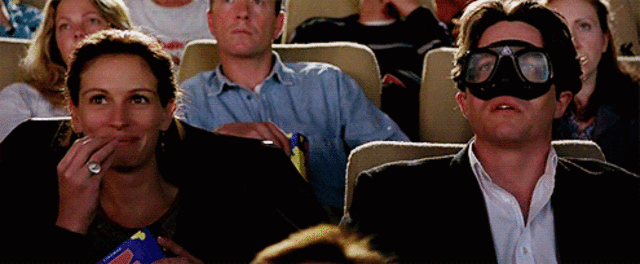When we miss the movie theater, what do we miss? A Popcorn Bucket!
Is it the immersive concentration in the all-black space, the kind of collective experience of watching movies, or the popcorn bucket scent filled with cold air?
Just like when I opened the door of the cafe, I would expect a mellow coffee aroma. When I smelled the caramel and butter flavor of popcorn in the mall, I knew that it was not far from the cinema.
Snacks represented by popcorn are an important business for movie theatres; for some viewers, it is not only a sense of smell and taste but also a “feeling” for the love of movies.
Popcorn Bucket is not only a business but also changed the movie?

At first, the movie theater owner did not want the audience to eat while watching the movie.
It’s easy to understand, whether it’s sticky hands or food falling on the ground, it will dirty the cinema environment.
In the late 1920s, a widow named Julia Braden persuaded the owner of Linwood Theater in Missouri to let her set up a stall in the cinema to sell snacks. Later, she expanded her stall into four movie theaters, earning US$14,400 (equivalent to the current US$336,000) in one year, and successfully managed to maintain revenue during the Great Depression.
Inspired by the success of the “Braden”, most theaters realized the “traffic business” under popcorn in the 1940s.
Theatre owners began to lower the price of movie tickets, attracting more people to watch movies in theatres, and more importantly, let them go through fragrant snack stalls to buy some delicious food. It is said that “every detail in the cinema was designed to divert the attention of customers to the menu board of the food sales department”.

The success of this model even led the entrepreneurs at the time to advocate :
“Find a good popcorn stall and build a theater around it.”
Popcorn Economy Affecting the Movie Duration

We will now use a “popcorn movie” to describe a relaxing movie, which is especially suitable for eating and watching popcorn, entertainment, and relaxation.
What is relatively little known is that the “popcorn economy” is affecting the setting of movie durations in the market.
Generally speaking, if the length of a movie exceeds 128 minutes, it will result in a reduction in the evening schedule, which also means that one less audience will pass through the canteen. Therefore, film studios generally control the length of the film within this range. Furthermore, reducing a film schedule will also reduce the box office, which is not a good business for studios and theatres.
To this day, the “popcorn economy” is still very important for the survival of theaters.
Public data points out that in 2019, Film’s merchandise and catering sales reached 1.926 billion, accounting for 12.48% of total revenue; New york’s movie sales were 73.1342 million, accounting for 6.61% of total revenue; and Jinyi Film’s sales Sales were 180 million, accounting for 8.71% of the total.
Moreover, compared with the box office income that needs to be split, the income from the sale of popcorn bucket and other snacks and other derivative products is all owned by the theatre, and the gross profit margin is also higher.
Bring Snacks to the Cinema is a Bit Complicated

Precisely because of the “popcorn economy”, most movie theaters used to stipulate that food outside was not allowed. On the one hand, this is to protect income, and on the other hand, it is relatively easy to control the overall odor problem in the theater.
In recent years, as multimedia and audiences pay more and more attention to the prohibition of take-out food in movie theaters, relevant authorities have also pointed out that this regulation violates the Consumer Protection Law, and many theaters have removed this regulation. (If you encounter a similar situation, consumers can complain to the market supervision department.)
However, for food that smells loud or eats loudly, most theaters still recommend consumers to store it. After all, no one wants to sit next to an audience eating melon seeds or stinky tofu.
Interestingly, whether to take out snacks when going to the movie theatre is not just a question of whether it can be. Some people will give more interpretation of the behaviour.
Stories of the Movie Theater

Some people think that when a boy takes the initiative to buy popcorn bucket and soda on the first date, it is a detail that makes people feel good; others are more extreme and advocate “don’t fall in love with boys who go to the cinema to bring their snacks”, thinking this means boys there is no sense of ritual.
Although these concepts are slightly rigid, it is undeniable that the combination of popcorn and movies has been romanticized. It may be the inadvertent touch of the hands of two people in the popcorn bucket or the joy of the unique sweet fragrance of popcorn.
Also, because the concept of “popcorn economy” is relatively popular in the West, people will have another divergence in discussions about whether to bring snacks to the cinema.
In 2018, there was a scolding war on Twitter. Seth Abramovitch, the senior author of The Hollywood Reporter, posted a tweet criticizing those who brought their snacks to the cinema:
Bringing snacks bought in the supermarket to the cinema to watch a movie can hardly be more frustrating and uneducated.
This remark naturally greeted criticism from many netizens. Some people criticized his remarks for sounding “like what the privileged class said,” and some netizens said directly that “it is silly to pay a 200% premium in the movie theater if you can buy it in the supermarket.”
Abramovitch added that he said, this is not a class bias, but that since audiences can afford movie tickets, they should also be able to buy snacks, and these consumptions are supporting local movie theatres.
Although Abramovitch’s initial words were excessive, he viewed it more from the perspective of the cinema industry and believed that buying premium snacks in cinemas was a way to support the film industry.
These are all personal choices. Whether you bring your snacks or buy popcorn in the theatre, as long as you don’t interfere with other audiences, the best solution is to let you enjoy the movie most happily.
Can there be a “popcorn economy” without watching movies?
Due to the epidemic, movie theaters were unable to open for business in the first half of this year.
To clear the temporary snack inventory promptly and at the same time reduce the burden of zero-income, many cinema professionals have transformed into “micro-businesses” and promoted the sale of cinema snacks on Moments and Weibo. In mid-February, Ele.me even launched the “Cinema Delivery Service” on the food delivery platform to provide movie theatres with a more convenient sales channel.
What’s more, after the Spring Festival this year, the Hollywood Film Group also began to carry food on the live broadcast. It is no longer limited to ordinary movie theatre snacks such as popcorn and potato chips and has begun to organize themed food promotion.
In May of this year, SFC Shanghai Studios launched a series of Shanghai classic snack products online with the theme of “Shanghai Style, National Tide, Nong Cut”, including the classic “Big White Rabbit” and Shanghai’s old ice brick brand Yimin The new young product “Xiong Xiaobai” ice cream, and the pear jelly that evolved from the special pear jelly candy of the Old Town God Temple…
At first, it was also to drive the inventory of some stores, but the effect was not expected to be particularly good.
In the future, they even plan to organize food-themed events in different regions together with stores across the country, and they may also bring local food to consumers. popcorn bucket
Without watching movies, the “popcorn economy” will lose its magic. popcorn bucket
Movie Theatres began to Turn Empty
To survive, some theaters began to turn empty theaters into “photo studios” for people to take wedding photos.
Even so, whether it is buying snacks or making “photo studios”, the income from these “temporary transformations” is really weak compared to the high fixed costs of rent, property, water, electricity, and coal.
No matter how popcorn makes money, the box office will always be the basis.
Said a person in charge of a theatre in Hollywood. Just as the original popcorn business was also a “traffic business”, the “popcorn economy” with a high gross profit after the loss of film audiences also appears weak.
The “Survey Report on the Living Conditions of Cinemas” of the Chinese Film Association pointed out that more than 40% of theatres in the world indicated that they are at risk of closing down. According to incomplete statistics, since 2020, more than 5,000 film and television companies have been cancelled and more than 2,000 theatres have closed down.
Going back to the question at the beginning of the article, “When we are missing the cinema, what are we missing?”
The answer is not the immersion of watching movies, the collective experience, or the sweet popcorn. They can all be replaced when they are taken apart.
What I miss should be the complete and unique experience that includes all of the above, but is more than that.
You may like this Article:
